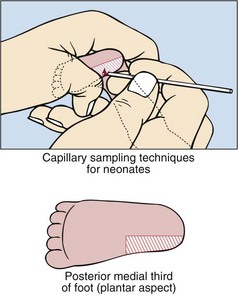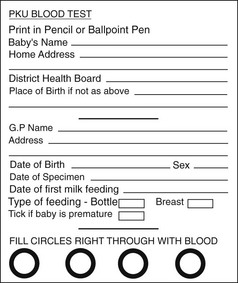78 Many countries have screening programmes for diseases at birth. In the UK, newborns are screened for congenital hypothyroidism, phenylketonuria, cystic fibrosis, sickle-cell disease and medium-chain acyl CoA dehydrogenase deficiency. A blood sample is collected from every baby around the seventh day of life. Capillary blood sampling in the neonate is best performed on the plantar aspect of the foot, especially on the medial aspect of the posterior third, as shown in Figure 78.1. A ‘blood spot’ is collected on to a thick filter paper card (Fig 78.2). The specimen can be conveniently sent by mail to a central screening laboratory. The following questions are usually considered when discussing the cost-effectiveness of a screening programme. Primary hypothyroidism is present in one in every 4000 births in the UK. There is often no clinical evidence at birth that the baby is abnormal, yet if congenital hypothyroidism is unrecognized and untreated, affected children develop irreversible mental retardation and the characteristic features of cretinism (Fig 78.3
Screening the newborn for disease
Neonatal screening programmes
 Does the disease have a relatively high incidence?
Does the disease have a relatively high incidence?
 Can the disease be detected within days of birth?
Can the disease be detected within days of birth?
 Can the disease be identified by a biochemical marker which can be easily measured?
Can the disease be identified by a biochemical marker which can be easily measured?
 Will the disease be missed clinically, and would this cause irreversible damage to the baby?
Will the disease be missed clinically, and would this cause irreversible damage to the baby?
 Is the disease treatable, and will the result of the screening test be available before any irreversible damage to the baby has occurred?
Is the disease treatable, and will the result of the screening test be available before any irreversible damage to the baby has occurred?
Congenital hypothyroidism
![]()
Stay updated, free articles. Join our Telegram channel

Full access? Get Clinical Tree


Screening the newborn for disease


